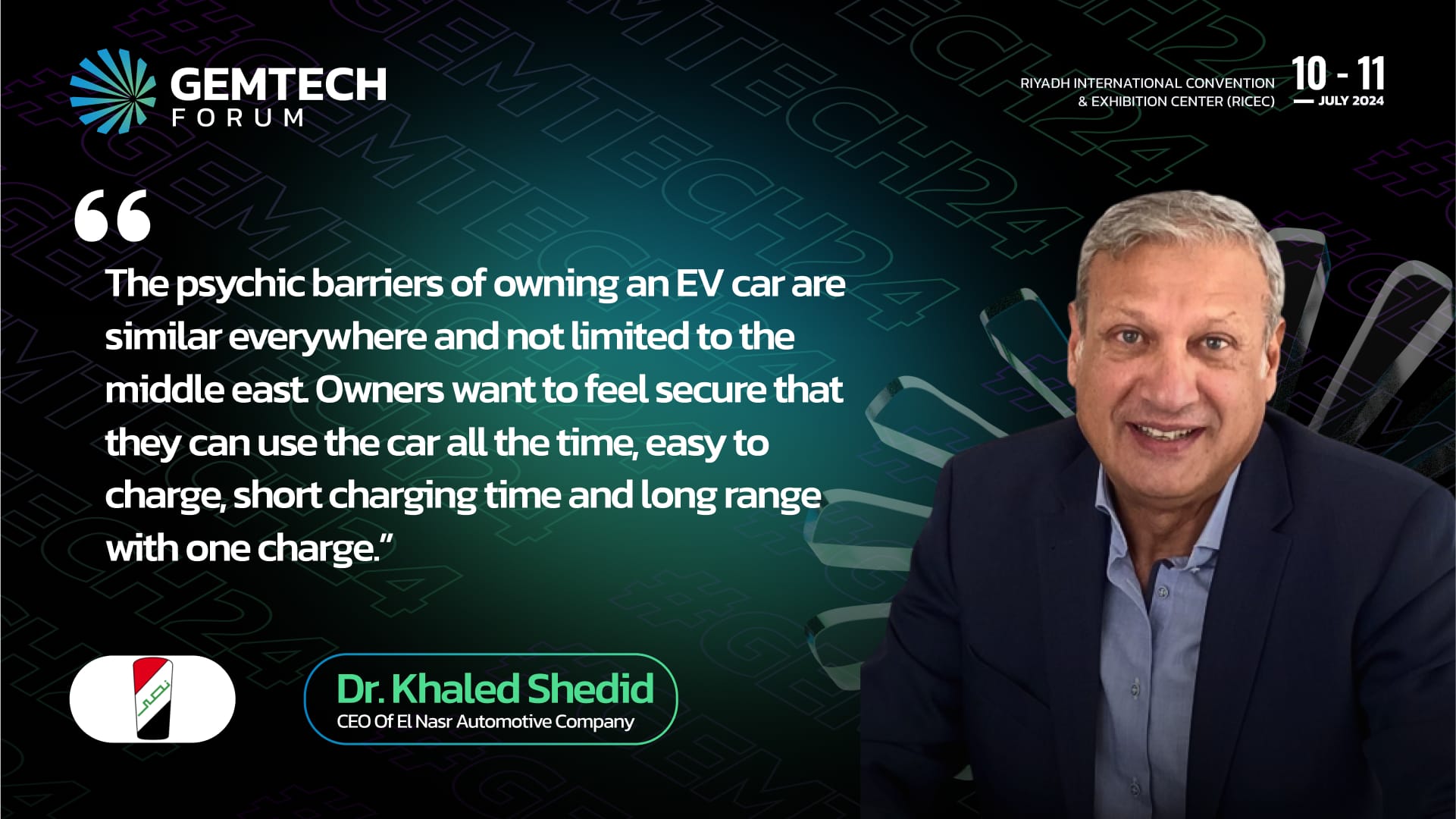We are delighted to present the Q&A session with Dr. Khaled Shedid, the CEO of El Nasr Automotive Company. Born in Egypt in 1962, Dr. Shedid holds both Egyptian and Swiss citizenship and has an impressive academic background, including a B.Sc. in Marine Engineering from Alexandria University, an MBA from Lucerne, and a DBA from Ain Shams University.
Dr. Shedid's career includes leadership roles at Haeselbarth Engineering, Schindler Elevators, MCV, and Bavarian Auto Group. He served as Chairman of El Nasr Automotive before becoming CEO in October 2023.
In addition to his professional achievements, Dr. Shedid has taught at various universities in Egypt over the past decade. In this session, conducted by Imran Mushtaq, Dr. Shedid shares insights on the future of electric vehicles (EVs), government incentives, and innovative strategies to promote sustainable transportation in the Middle East.
#GEMTECH: With several countries in the Middle East setting ambitious EV adoption targets, what are some creative ways these nations are incentivizing the development of a local EV manufacturing base?
#Dr. Khaled Shedid: There are many ways to incentivise and encourage people to use EV cars. The major point in the concept is how to eliminate/reduce the psychic barrier of the customers against using new technology. Below is a small list of some actions which can be taken to support owners in their decision to own an EV car:
- Ecosystem: build up a charging network that make It easy for people to use:
- Mandatory charging stations for all buildings as a prerequisite to receive building operational license (in specific, malls, office buildings, hotels, universities, compounds), in return, some real estate tax incentives can be offered.
- Subsidized/free charging fees
- Custom duty exemption on importation
- Reduced licensing tax
- Reduced parking fees
- Special number plate
#GEMTECH: How is the Egyptian government supporting the local manufacturing of electric cars?
#Dr. Khaled Shedid: Egypt has issued an Automotive Industrial Development Program AIDP, which gives lots of incentive for local manufacturing based on the below parameters. The concept aims to achieve the following:
- Increasing local content % in the production (above 45%)
- Increasing production volumes
- Increasing investment
- Eco-friendly cars
- Every achieved pillar shall receive a bonus paid back to the manufacturer
- An Eco-Tax is under analysis in the Egyptian Parliament on all ICE cars to support Electric vehicles
#GEMTECH: Are there any additional initiatives beyond incentives and manufacturing that Egypt is undertaking to promote EVs?
#Dr. Khaled Shedid: On top of this program, Egypt adopted limited measures to incentivize demand for NEVs in Egypt These measures have included:
1. Financial support worth EGP 50,000 (currently, USD 1000) to buyers of locally manufactured NEVs was adopted by the Cabinet of Ministers. This support has yet to be rolled out to NEV customers.
2. Facilities for EV charging stations were adopted by the Ministry of Electricity and Renewable Energy through a series of decrees. For example:
- Home charging points may be installed without prior licensing requirements.
- The cost of EV charging at home is calculated based on electric residential tariffs.
- A competitive pricing scheme for public EV charging at stations was approved.
#GEMTECH: The Middle East boasts abundant sunshine and a growing focus on sustainability. How are these factors driving innovation and investment in electric vehicle technology and infrastructure in the region?
#Dr. Khaled Shedid: The psychic barriers of owning an EV car are similar everywhere and not limited to the middle east. Owners want to feel secure that they can use the car all the time, easy to charge, short charging time and long range with one charge. These requirements are well known to the producers and they do work on the following factors in their efforts and innovations to improve the vehicle technology and the infrastructure dependency:
- New battery material to reduce cost and increase range (such as solid lithium battery and Sodium batteries)
- Battery swap concept to reduce charging time. Where some companies developed a concept to enable modular battery upgrading for longer range
#GEMTECH: Since the advancement of the EV industry relies heavily on global collaboration, how do events like the GEMTECH Forum facilitate this collaboration and accelerate progress in the field?
#Dr. Khaled Shedid: Such events are key for the development of the industry through:
- Updating knowledge and information
- Information about future direction and business tendency
- Excellent platform for communication and exchanging experience
- Excellent platform to get to know issues, problems and approaches to solve them of others
- get in contact with suppliers, manufacturers and dealers.

